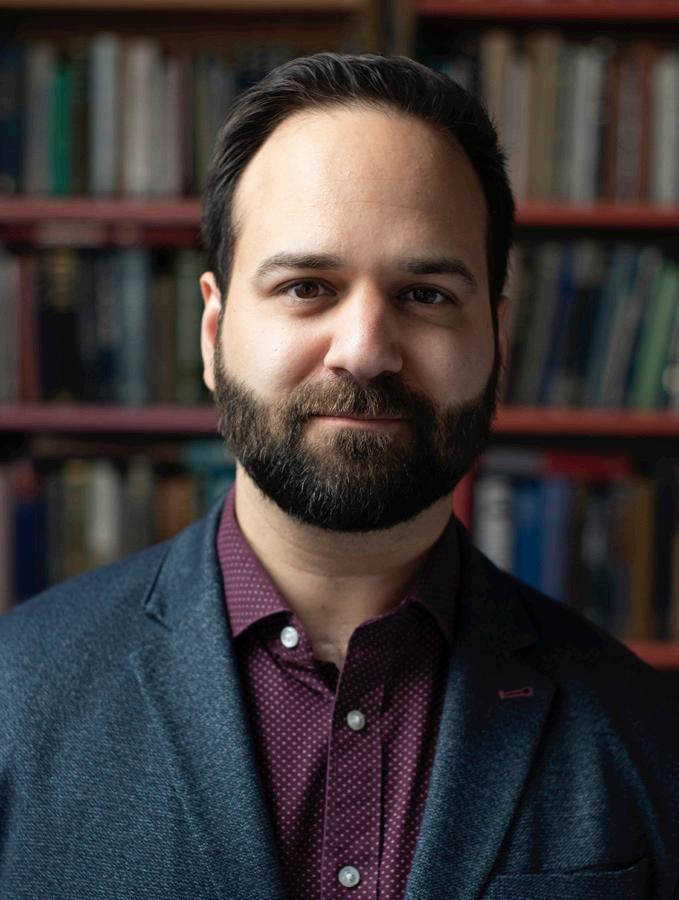
5 minute read
Alum Profile: Dennis Perepelitsa ’00 LS
Fleeting Views of All That Matter
by Jeannie Evers
Advertisement
As an experimental nuclear physicist, Dennis Perepelitsa ’00 LS studies very small particles of matter that exist for just a fraction of a second. The thing he’s after in that fraction of a second is nothing less than a glimpse into the origins of the universe.
An assistant professor of physics at the University of Colorado (CU) Boulder, Dennis studies what happens when two beams of particles collide at nearly the speed of light, producing the hottest matter ever made on Earth. “The particles slam with such high energy that they create a whole lot of other different particles to study, new and exotic particles we can’t normally access,” he explains. One of those rare creations is something called quark-gluon plasma, a subatomic “soup” that is the focus of his research. “That’s the phase of matter that all of the universe was in just after the Big Bang. By studying what happens in these collisions, we’re studying in a controlled lab setting how the early universe would have evolved shortly after its creation.”

A view of the Large Hadron Collider in Switzerland, one of two particle accelerators where Dennis Perepelitsa ’00 LS conducts his research.
Dennis conducts research at the Large Hadron Collider near Geneva, Switzerland, and the Relativistic Heavy Ion Collider at the Brookhaven National Laboratory in New York. As a doctoral student at Columbia University, he was the first scientist to earn outstanding Ph.D. thesis awards from the research communities at both of these particle colliders. Recognition for his work has only grown from there. In 2017, he won an Early Career Award from the U.S. Department of Energy, which came with a five-year, $750,000 grant. In February of this year, he was one of 25 early career science scholars to receive a $100,000 Cottrell Scholar Award from the Research Corporation for Science Advancement. The award recognizes those who integrate scientific teaching and research. Dennis’ proposal included a plan to give undergraduates more experience with computational physics. There’s a growing need for scientists to be proficient with technical skills. “A lot of what we do is reconstructing or analyzing the data. That’s where the science comes from at the end of the day,” he says.

Born in Moscow, Dennis moved with his family to the United States in the 1990s. (“I didn’t learn English until I was seven, but that’s young enough to not have an accent,” he jokes.) They settled in Monterey when his mother got a job at the Presidio. After attending school in Pacific Grove, young Dennis came to Santa Catalina for seventh and eighth grade. It was a short but influential time. In grade 8, he was allowed to take geometry with the Upper School girls rather than algebra with his peers. “It was a little funny being an eighth-grade boy in a class of high school girls, but I respect that the school identified that I would benefit and made accommodations,” he notes. The experience taught him something beyond shapes and formulas. “Somehow, this idea that I can imagine something bigger and go beyond what other people are doing—it expanded my mind as to what was possible,” he adds.
Dennis also appreciates the soft skills he gained in his two years at Catalina. Emotional intelligence, the ability to work collaboratively, to be organized, creative, and take initiative—these skills are essential for research in a university setting. “My memory was that at Catalina, there was a holistic sense to the whole curriculum, from P.E. on up,” he says.
For high school, he attended York, where he became involved in the theater program. Here, too, he draws a connection to his current work, this time as a professor. “I do think those experiences made it easier to be at the front of the classroom, to improvise and lecture in real time and keep students interested,” he says. He enrolled at the Massachusetts Institute of Technology intending to be a mathematician but discovered he was drawn to math more as it relates to computer science and physical problems. A quantum mechanics class set him on his current path.
Modern science is becoming increasingly collaborative, international, and interdisciplinary. One reason Dennis chose to continue his research at CU was so he could lead a team. “The science I wanted to do, no one person, no matter how smart, could do it alone,” he says. He encourages budding scientists to study abroad so they can learn how to be collegial with people from around the world, and to explore interests outside their own so they can better make connections between fields.
All of this collaboration means that new discoveries don’t stay secret for long. For Dennis, though, the moment of discovery is almost a zen moment. As he puts it: “I really like the idea that we’re studying phenomena that no human has observed before. Not every discovery in physics is groundbreaking, but we are learning a lot of interesting things about how nature behaves.” To be the first person to see something so fundamental—well, you’d want to make that fraction of a second last as long as possible.


